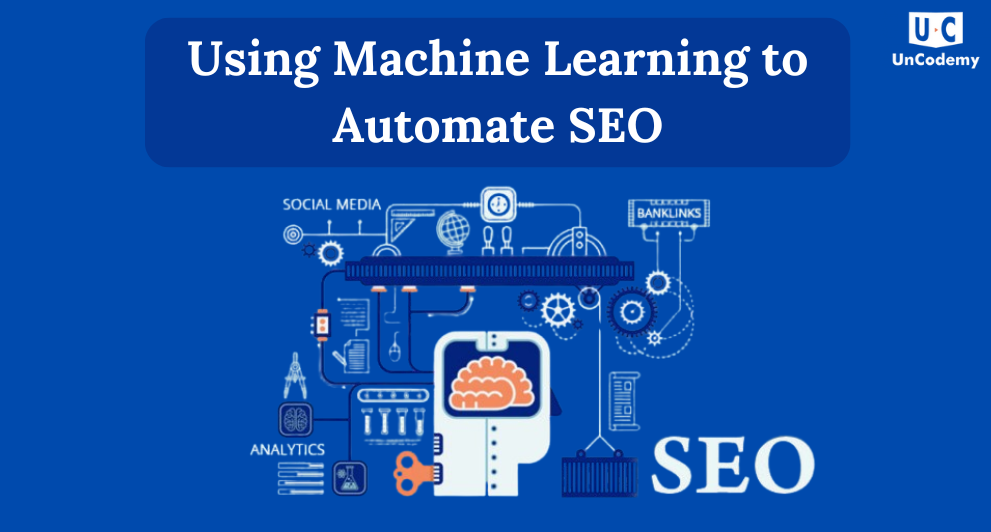Machine-learning-automate-seo-efficiency



Search Engine Optimization (SEO) is a crucial aspect of digital marketing, as it helps businesses improve their online visibility and drive organic traffic to their websites. However, SEO can be a time-consuming and complex process, requiring constant monitoring, adjustments, and data analysis. As a result, many marketers and businesses are turning to machine learning (ML) to streamline SEO tasks and improve their overall efficiency.
Machine learning, a branch of artificial intelligence (AI), focuses on developing algorithms that can automatically learn and make decisions from data. By leveraging ML models, businesses can automate a variety of SEO tasks, leading to more effective optimization and better results.
In this blog post, we’ll explore how machine learning can be used to automate SEO tasks, enhance efficiency, and ultimately improve your website’s ranking on search engines.
Before diving into how machine learning can automate SEO tasks, it’s important to understand the basics of both SEO and machine learning.
SEO is the process of optimizing a website to rank higher in search engine results pages (SERPs) for specific keywords and phrases. The goal of SEO is to increase the quality and quantity of organic traffic to a website by improving its visibility in search engine results.
Machine Learning (ML), on the other hand, is a branch of artificial intelligence (AI) that allows systems to automatically learn from data, identify patterns, and make predictions or decisions without explicit programming. In the context of SEO, machine learning can be used to analyze large sets of data, automate repetitive tasks, and make smarter decisions based on trends and patterns.
By combining SEO with machine learning, businesses can create data-driven strategies, improve decision-making, and save valuable time and resources.
How Machine Learning Enhances SEO
Machine learning has the potential to enhance SEO efforts in several ways:
Now that we understand how machine learning enhances SEO, let’s take a deeper dive into some of the key applications of machine learning in SEO.
Keyword research is one of the foundational tasks in SEO. It involves identifying the words and phrases that users are searching for about your business or industry. Traditionally, keyword research has been a manual task that involves analyzing search volume, competition, and relevance.
Machine learning can automate this process by analyzing large datasets to identify trends, understand user intent, and suggest the most relevant and high-performing keywords for a website. By using machine learning-powered tools, SEO professionals can discover long-tail keywords, LSI (Latent Semantic Indexing) keywords, and other valuable terms that may not have been previously considered.
For instance, tools like Google’s Keyword Planner, SEMrush, and Ahrefs incorporate machine learning algorithms to suggest keywords based on past search behavior, providing insights into keyword trends and helping marketers make data-driven decisions.
Content is at the heart of SEO. Search engines favor websites with high-quality, relevant, and well-structured content. However, creating content that ranks well requires a deep understanding of both keyword usage and user intent.
Tools like Clearscope, MarketMuse, and SurferSEO utilize machine learning to help users optimize their content for both search engines and human readers. These tools analyze large datasets to identify the most effective ways to optimize content and suggest improvements in real time.
Technical SEO involves optimizing a website’s infrastructure to ensure that search engines can crawl, index, and rank pages effectively. Tasks like improving site speed, fixing broken links, and ensuring mobile responsiveness are critical to technical SEO.
For example, platforms like DeepCrawl and Screaming Frog SEO Spider use machine learning to automatically scan and analyze websites, providing recommendations on technical issues that need attention.
Link building is a vital aspect of off-page SEO, as backlinks from high-quality, authoritative websites can significantly impact a website’s search rankings. However, manual link building is time-consuming and requires constant outreach and relationship building.
With the help of tools like Ahrefs, Majestic, and Moz, SEO professionals can use machine learning to identify relevant websites, monitor backlink profiles, and automate outreach strategies.
User experience (UX) plays a critical role in SEO. Google’s algorithms take into account factors like page load speed, mobile-friendliness, and the overall user experience when determining rankings. Machine learning can help optimize UX by:
Machine learning tools like Hotjar, Crazy Egg, and Google Analytics can help analyze user interactions with your site and provide insights for improving UX.
Overview: HubSpot, a leading inbound marketing software company, has integrated machine learning into its SEO tools to provide users with data-driven insights that enhance their website’s search performance.
Machine Learning Application: HubSpot’s SEO tool uses machine learning to analyze a website’s performance, identify content gaps, and provide keyword suggestions. Here’s how machine learning plays a role:
Impact: HubSpot’s SEO tool has enabled marketers to automate time-consuming SEO tasks, such as keyword research and technical audits. By leveraging machine learning, HubSpot helps businesses create optimized content strategies and improve their website’s organic search performance.
Overview: SEMrush is one of the most popular SEO tools, widely used for keyword research, competitor analysis, backlink tracking, and more. The platform incorporates machine learning to streamline and enhance its keyword research capabilities.
Machine Learning Application: SEMrush uses machine learning algorithms to analyze vast amounts of data to identify keyword opportunities. Here’s how it works:
Impact: SEMrush’s integration of machine learning into its keyword research tools has made it easier for businesses to identify high-value keywords, improve content targeting, and ultimately enhance their organic search rankings.
In today’s competitive digital landscape, staying ahead of the competition is crucial. Machine learning provides SEO professionals with valuable insights into competitor strategies, helping businesses refine their SEO approaches.
Machine learning can analyze competitor websites, track keyword rankings, and examine backlink profiles, offering a comprehensive view of where competitors are succeeding and where there may be opportunities for improvement.
Machine learning in SEO refers to the use of algorithms and data-driven models to analyze and optimize various aspects of a website’s SEO strategy. These algorithms can automate tasks such as keyword research, content optimization, technical audits, and performance predictions, enhancing efficiency and accuracy.
Machine learning analyzes vast amounts of data to identify trends, search volumes, competition, and user intent. It helps uncover high-performing keywords, suggests related long-tail keywords, and predicts keyword success, enabling SEO professionals to focus on the most relevant terms.
Machine learning can automate several repetitive SEO tasks, including keyword research, content optimization, technical site audits (e.g., broken links, crawl errors), backlink analysis, and performance monitoring. Automation improves efficiency and saves time for more strategic tasks.
Machine learning models analyze top-ranking pages for specific keywords, studying content structure, keyword usage, and topics covered. This helps identify content gaps, optimize for user intent, and suggest improvements to boost rankings and engagement.
Yes, machine learning can analyze past ranking data, algorithm changes, and industry trends to predict potential changes in rankings. This helps SEO professionals adjust strategies proactively, ensuring continuous improvement in search visibility.
Machine learning can automate the detection of technical issues, such as crawl errors, broken links, or slow loading speeds, by analyzing a website’s infrastructure. It also helps prioritize fixes that will have the greatest impact on search rankings.
Absolutely. Machine learning helps analyze competitors’ websites, their keyword strategies, backlink profiles, and content performance. This information can be used to identify opportunities for improvement and stay ahead of competitors in search engine rankings.
Machine learning analyzes user behavior on websites, such as click-through rates, bounce rates, and time on the page. It then suggests improvements to UX elements like page layout, navigation, and speed, all of which positively influence search engine rankings.
While some machine learning tools require technical expertise to set up, many SEO platforms have integrated ML features that are user-friendly and accessible to marketers. These tools typically provide actionable insights and automate complex tasks without requiring advanced programming skills.
In the long run, machine learning improves SEO efficiency, drives more relevant organic traffic, and enhances the accuracy of optimization strategies. It helps businesses stay adaptable to search engine algorithm changes, reduce manual effort, and continuously improve their SEO performance.
Personalized learning paths with interactive materials and progress tracking for optimal learning experience.
Explore LMSCreate professional, ATS-optimized resumes tailored for tech roles with intelligent suggestions.
Build ResumeDetailed analysis of how your resume performs in Applicant Tracking Systems with actionable insights.
Check ResumeAI analyzes your code for efficiency, best practices, and bugs with instant feedback.
Try Code ReviewPractice coding in 20+ languages with our cloud-based compiler that works on any device.
Start Coding TRENDING
TRENDING BESTSELLER
BESTSELLER BESTSELLER
BESTSELLER TRENDING
TRENDING HOT
HOT BESTSELLER
BESTSELLER HOT
HOT BESTSELLER
BESTSELLER BESTSELLER
BESTSELLER HOT
HOT POPULAR
POPULAR